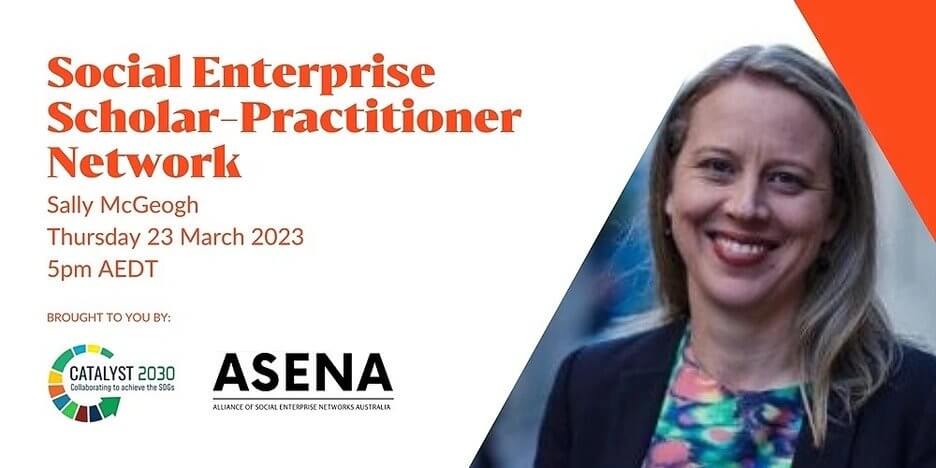Events

- This event has passed.
Social Enterprise Scholar-Practitioner forum – Sally McGeogh from Westpac Foundation
23 March 2023 @ 5:00 pm - 6:00 pm
Catalyst 2030 is the global movement mobilising to accelerate the achievement of the UN SDGs by 2030.
The Social Enterprise Scholar Practitioner Network was formed to create a closer bond, intersectional identity and knowledge exchange between social enterprise practitioners and academia.
At the Thursday session in March, join us as we hear from Sally McGeogh, Senior Advisor, Westpac Foundation.
“Going Slow to Go Fast: How Work Integrated Social Enterprise navigate cross sector collaborations to create systems change”
Each month the SE Scholar-Practitioner Networks holds a Tuesday morning and Thursday afternoon session (AEST), to reach different audiences around the globe.
Check out the Tuesday morning session too!
Synopsis of “Going Slow to Go Fast” by Sally McGeogh
It is widely acknowledged that complex social problems such as unemployment need cross-sector approaches that bring diverse actors together and take a systems lens to driving social innovation. In particular, work integration social enterprises (WISE) that engage in cross-sector collaboration have considerable potential to create new solutions to integrate people at risk of permanent exclusion from the labour market into meaningful work. WISEs are uniquely positioned to act as “vectors for social innovation” due to their deep local knowledge and high levels of trust and social capital in the social ecosystem. Their strong convening power is also a feature of their hybrid social-commercial nature and entrepreneurial approach as “bricoleurs”, bridging sectors and forging collective solutions that create the enabling environment for systems change.
However, despite the evidence of their abilities as effective intermediators, there is limited empirical research on how WISE engage in cross-sector collaboration and network building to scale their impact and create systems change. This presentation shares early preliminary findings based on three case studies of WISE (STREAT, Jigsaw and White Box Enterprises) involved in a multi-year action research study to understand the role of cross-sector collaboration in supporting them to scale employment outcomes for Australians experiencing disadvantage. The findings highlight the key challenges and organisational tensions for WISE in resourcing collaboration, particularly when the pandemic has forced many to focus on short-term survivability.
Cross-sector collaboration requires a level of systems leadership to look beyond organisational boundaries to develop the mindset and skills to foster connections and knowledge sharing across a messy and dynamic system. It is a complex, slow, and emergent process of building and bridging relationships of trust and shared learning but an essential prerequisite to transforming the employment system. The practical implications of the research suggest a need for greater investment in the collaborative capacity of WISE to allow them time and space to curate, connect, and participate in networks and collaborations to share and elevate their local experience and demonstrated impacts. Other actors in the system such as funders also need to adapt their approach to help create this enabling environment for WISE to lead systems change efforts. The conceptual implications of the research to date contribute to the reframing of WISE as having the capacity to act as complexity-informed systems stewards capable of engaging in cross-sector collaboration as a means of catalysing social innovation and systems transitions.

